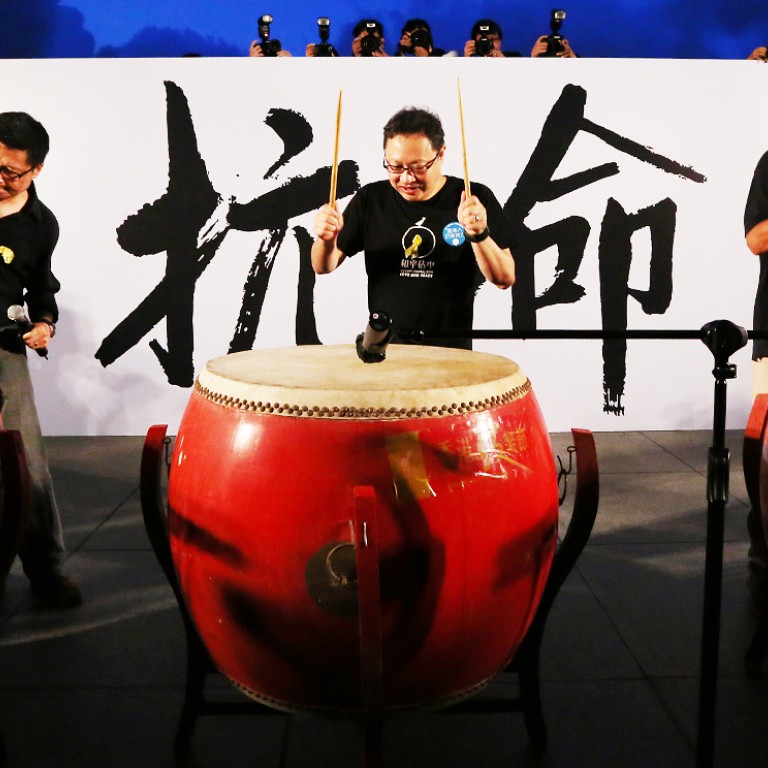
Occupy Central will be divided into groups in case police use tear gas, organisers reveal
Movement's organisers say the thousands it expects to protest will be broken into groups to allow for easier withdrawal if police get tough
Occupy Central organisers will divide supporters into groups instead of keeping them in a single mass so they can be withdrawn more easily if police decide to use tear gas to stop their civil disobedience action.
Group leaders will be told to evacuate protesters under their command as soon as the choking gas is used in their area, two of the movement's founders told the .
"This is our bottom line," the Reverend Chu Yiu-ming said. "We will call on the group leaders to evacuate the participants once tear gas is thrown to their zones."
Chu said he and his two co-organisers were "willing to pay the price" of taking part in the sit-in. "But we also have the responsibility to ensure the safety of all participants," he said.
The veteran activist said the media, citizens and the international community would "have their own views" if police used tear gas.
Chu also urged police not to use long-range acoustic devices known as sound cannon - which emit pain-inducing tones - as they can cause permanent harm.
The police refused to comment on details of their operation to cope with the protest.
However, officers were seen carrying tear-gas launchers during an anti-riot drill in the Tseung Kwan O Industrial Estate in July. The drill was seen as preparing for possible chaos caused by an occupation of Central.
Chu's remarks came as the Civil Human Rights Front applied to host a rally on National Day, October 1, at Chater Road in Central. Many expect the movement's first sit-in will be held after the rally to protest against Beijing's restrictive framework for the city's electoral reform.
Occupy organisers have yet to disclose the exact time and place for their action to avoid being arrested beforehand. But Chu said the movement would have to use its undisclosed "Plan B" - which might bring more disturbance to society - if police turned down its application to rally in Central on the date and place it planned.
Chu, who is responsible for arranging materials and crowd control for the sit-in, also gave details of preparations for the protest which were now under way.
Some 140 medical professionals would set up six booths inside and outside the protest area to take care of participants' physical health, while their emotional and spiritual well-being would be catered for by groups of counsellors and pastors.
A group of lawyers - independent of the movement - would also be on standby, while others would monitor police actions. An indoor command and communication centre would give bilingual reports on the events.
Unlike the usual pro-democracy protests, Chu said the "banquet" - codename of Occupy Central - would be relatively quiet and peaceful. "We believe the power of silence is stronger than that of violence," he said, and it would also provide a contrast to possible police action.
The silence would be broken from time to time by drums to boost morale, and classical music would also be played.
Chu and co-organiser Dr Chan Kin-man expect a turnout of thousands for the first sit-in, though not necessarily the 10,000 originally set as a target.
Both said the power of bystanders - who did not need to break the law - should not be underestimated. Besides offering support to protesters, Chan said bystanders could monitor whether police abused their power during any clearing action.
Meanwhile, Occupy Central has learned from the sit-in staged by students on July 2, when police cut the power supply before they cleared the scene.
"There would be no orders if there's no sound," Chu said, adding that this was another reason why the crowd would be divided into groups.
Group leaders would use megaphones or pass round memos if the power was cut.
Chu, who helped Beijing student leaders flee China after the crackdown on Tiananmen Square protests on June 4, 1989, urged the media to closely monitor the Occupy action.
"Once [the police] expel the reporters from the scene, they can do everything they want," he said.



